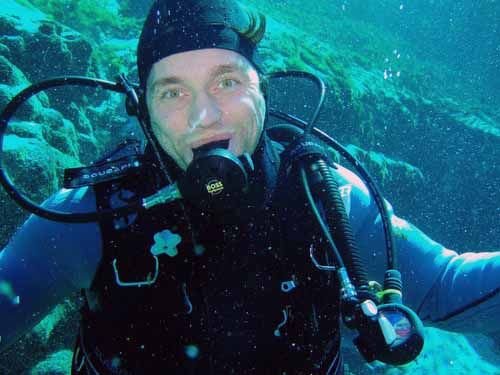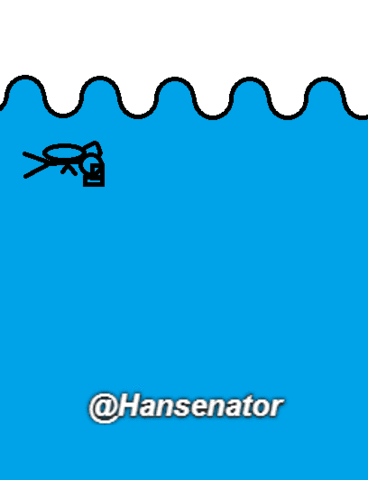SCUBA Diving Basics - Pressure (+ My Bad Experience)
This is my favorite topic to go over in physics class because of the interesting fact that you breathe more air when you go deeper into water. I will explain what happens to your body in terms of pressure and how the air you breath in through your regulator (breathing device) is changed as well. They are really interesting facts and good to know in case of emergencies!
Pressure When Diving
First of all, if you remember from high school physics, as pressure increases, volume decreases. There are a few forms of measurement of pressure. I will use ATM, or atmospheres, because it is the most simple. At sea level, you are under 1 ATM of pressure. So, here is the cool part! Every 33.8 ft. or 10.3 meters you descend in water you gain 1 ATM, so 10 m of water gives us the same amount of pressure ALL the air above our head gives us because it is far denser. Here is a diagram:

Now, we can talk a little bit more about how much air you breath when you dive. Under each ATM you breath DOUBLE what you did under the last because volume is cut in half, so a bubble at the bottom of the ocean might cause a title wave at the top depending on how big it was. This can sink ships and has been theorized to be a cause of the Bermuda Triangle disappearances. Observe our picture again!

You can see how this can be troubling. It could literally come out of nowhere. Here is our breathing table (the average human lung capacity is 6 liters of air with a full breathe):
| Pressure | Volume of Breathe | Depth in Water |
|---|---|---|
| 1 ATM | 6 Liters | 0 m |
| 2 ATM | 12 Liters | 10.3 m |
| 3 ATM | 24 Liters | 20.6 m |
| 4 ATM | 48 Liters | 40.9 m |
| 5 ATM | 96 Liters | 61.2 m |
| ... | ... | ... |
A you can see... It gets huge, fast! Conserve air!!!
Physiological Effects
This air is in your body! Therefore, if you ascend too quickly the following could happen:
- Your lungs could explode if you do not breathe out!
- When you breathe there are molecules in the air other then oxygen. Nitrogen can become a problem (it has for me before when I had a diving accident) because it is absorbed into your blood. This will also expand when you rise and could cause an embolism which can result in killer headaches, or death, depending on how bad it is. This is called The Bends.
- Your sinuses decompress themselves, but your ears only do it on the way down. You have to Equalize manually every ten feet you descend in water or you will pop your ear drums. You do this by pinching your nose and blowing out. Try it now!
- A diver can descend as quickly as he/she wants because it is all manual on the way down, but on the way up you go very slowly and breathe out all of the time!
My Bad Experience
When doing a training dive I was required to take my mask off, put it back on, and clear the water out of it by blowing out of my nose. It looks like this:

Well... Haha. I did not do this right. When I went to put my mask back on I forced some water up my nose causing me to cough. I freaked out. Tossed my mask and headed to the surface from under 35 feet of water. I did breath out, but still went up way to fast! The instructor followed me up and we went back down, so I could "decompress" (let the nitrogen bubbles in my body release themselves slowly). This was the absolute worst headache I've ever experienced in my life. The only treatment I received was that the instructor pressed both pressure points on my hands (I guess this causes less bloodflow, less nitrogen in the brain). PAINFUL! Don't do this please!
I hope you enjoyed the lesson Steemians! Please check out my page if you're bored, there's a lot of interesting travel/fun/investment/tutorial blogs. Happy trails! Learn much and show your children!


I'm a fellow diver. I remember the taking off of the mask and putting it back on during training. Came in handy one time because I always dive with my dad and one time we accidentally wore each others masks into the water. Both of us couldn't get the other person's mask adjusted properly to stop leaking so we decided to just switch masks back while under water (we were at 75 feet so didn't wanna go all the way back up). We did it super smoothly so I was very thankful for that training that day or that dive would have been ruined by leaky masks.
It's a necessary task to know. If the water is cold it is a shock though. Haha. I just should have breathed out of my nose when pushing it on. Thanks for the experience!
Be careful down there!! Sounds like you were pretty lucky. Decompression is nothing to play with. Take it nice and slow going back up.
Only being down about 35 feet (10m) or so, isn't too bad. If you were deeper you would have risked some very serious injuries.
When I was doing my Open Water cert. we did the regulator recovery exercise and I freaked out a little, but recovered when I remembered the secondary air supply (octopus) on my belt. We were 15m down and it would have been REALLY dangerous to shoot to the surface.
Be safe!!
Yes. I remember. The training can be pretty intense when learning. I think I was about 15. Haven't done too much diving recently though.
Hey @hansenator! Man glad you made it ok after the problem with your mask! That definitely must have been scary and disorienting when the water went up your nose.
Great post on pressure and how've it applies to diving! I just wrote an article on the general feeling of diving that I feel when I go out- let me know what you think! How did the rest of your training go?
Ahh Thank you! I'll check it out! It went fine. Got certified in navigation a few months later.
Nice! Ah man it took me a while to get used to navigation... underwater with a compass... I didn't even know how to use one above water when I started! Glad it all went good!
It was fun. When we were doing the practical I had to do a re-run because I ended up in the middle of nowhere with my cousin. Haha. Got it the second time. Alexander Springs, Florida.
This is a really important topic to cover. It is basics for scuba divers, but unfortunately many new divers don't take it serious enough, resulting in death. Great post!
Very informative! Lets grow our divingcommunity on steem..
I will follow you for more nice posts like that! Feel free to check my divingposts about tresher sharks! Looking forward to see more of you! Cheers